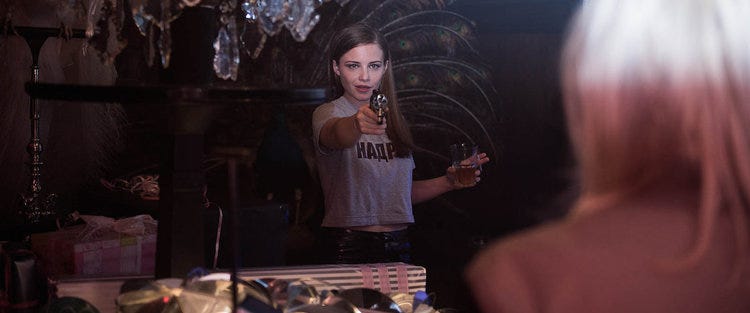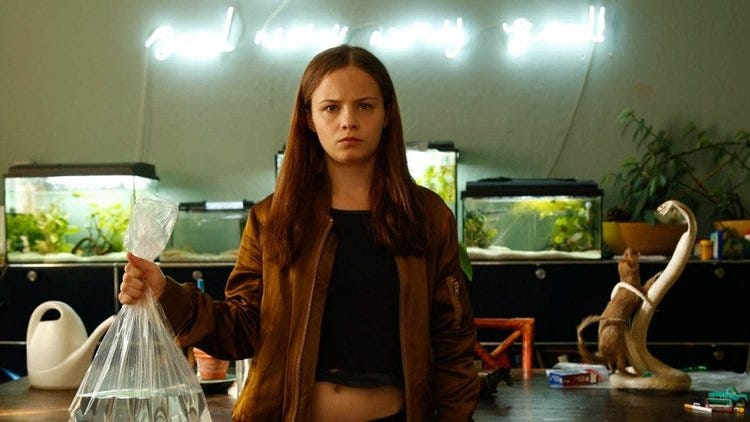axolotl overkill
FIlm, 2017, 3 stars
Written and Directed: Helene Hegemann (from her own novel)
For a semi-biographical film to be truly successful, the filmmaker needs to find a way to connect their audience to their very personal story, draw us in somehow in a way that makes us care about the outcome. While I won’t deny Axolotl Overkill had some special moments and is spectacularly well filmed, unfortunately I think Helene Hegemann has missed the mark on drawing us in enough to care about her self-destructing heroine.
Made originally as a short film and now as a feature, Axolotl Overkill takes place in the underbelly of Berlin, and follows 16-year-old Mifti as she unravels in the face of life, due mostly to her inability to properly process the horror of it. Mifti is mourning her recently-deceased mother. She has a distanced relationship with her father who acts more like a child than she does. She lives with her half-siblings, and her half-sister tries desperately to get her to go to school and live a semblance of a normal life.
We learn that Mifti has just emerged from an affair with a (much) older woman, Alice, somebody who is obviously a replacement mother-figure, and who continues to float carelessly in and out of Mifti's life in a horrible case of child sexual abuse. Through a weird incident at school she also meets Ophelia, a drugged-out actress who gives Mifti occasional affection and the ticket she is looking for into the Berlin party world.
Mifti is desperate for emotional connections of any kind, and she throws herself from person to person, male or female, regardless of her own personal safety. She spends days in a drug-and-alcohol-fuelled haze, to the point where when her sister asks her where she has been she’s unable to answer because she genuinely doesn’t know.
Mifti is also self-absorbed, lost in her own depression, impossible to reach, despite the efforts of teachers and family. The problem is, she’s also impossible for us to empathise with. There are moments of technical brilliance where you start to think, yes I’m being drawn into this girl's journey, maybe I’m finding a way to understand some of what’s happening. Then, as quickly as it happens, a cinematic door is slammed in our faces and we find ourselves confused and on the outer again. I found it too hard to sustain any interest in what happened, so painfully removed is Mifti from any kind of reality or motivations I can recognise. The time shifts back and forth also serve to disconnect us from the narrative.
Perhaps it was on purpose. Perhaps Hegemann wanted us kept at arms length, witnesses to Mifti’s unravelling but, just like the people in her life, none of it can make any sense to us. She will go her own way, we will watch it in an emotionless state, and it will all end as senselessly as it began, with no hope or path forward that we can see.
The moments of brilliance – a well-placed song, a still moment with Mifti’s tired face shrouded in ever-present smoke, a joke that has been set up beautifully, a perfectly-framed landscape as Mifti steals a car and drives off into the distance – are too few and far between to rescue us from the endless, relentless scenes of depression and isolation.
I hate to say that when the film was over, I was glad to be free from it. Watching this was like being the embarrassed third wheel at a seedy party where you don’t know anyone, nobody will talk to you, everyone is drunk or on drugs, and you just can’t wait to leave. It doesn’t matter that it looked beautiful, that the actresses threw everything they had at this script, that the director was telling an obviously intensely personal story. She was telling it for herself, and leaving us out of it. I wanted to love it, to feel it, but the filmmaker wouldn't, or couldn't, let me.




